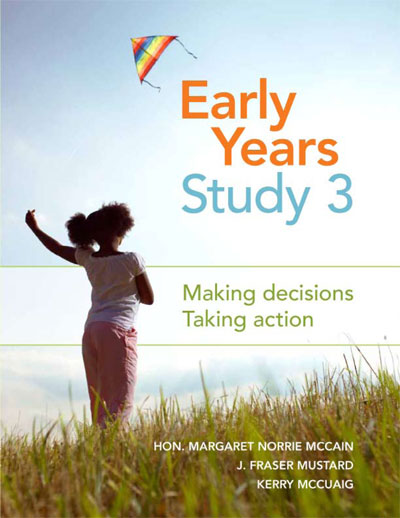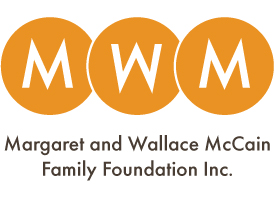 November 22, 2011. Co-authored by the Hon. Margaret Norrie McCain, Fraser Mustard and Kerry McCuaig, the third edition of the Early Years Study: Making Decisions, Taking Action is launched.
November 22, 2011. Co-authored by the Hon. Margaret Norrie McCain, Fraser Mustard and Kerry McCuaig, the third edition of the Early Years Study: Making Decisions, Taking Action is launched.
The federal government may have ended the national child care plan in 2007 but that hasn’t stopped the provinces from making progress, a new report released today in Toronto and Montreal reveals. “Our report shows we may be developing a Canadian early learning and child care program one province at a time,” says the report’s co-author, the Honourable Margaret Norrie McCain.
Early Years Study 3 is the third in a trio of reports on the state of early childhood learning by Mrs. McCain and world leading scientist Dr. J. Fraser Mustard who died last week. The study provides the social, economic and scientific rationale for public investments in young children and recommends that all children be entitled to an early education from age two.
“Our contemporaries in the Organisation for Economic Co-operation and Development (OECD) have changed the discussion from the need to mind the children of working parents, to stimulating all children,” the report reads. “Driven by a massive body of research that points to the importance of the early years for future health, behavior and learning, they have invested heavily in early childhood programs, largely by including younger children in public education.”
The Early Years Study 3 introduces the Early Childhood Education Index, a tool that examines the state of early education across the provinces. “The index allows us to go beyond counting spaces and adding up dollars, to ask if public funding is being spent effectively to ensure the programs children attend are good,” says Kerry McCuaig, fellow in early childhood policy at the Atkinson Centre, Ontario Institute for Studies in Education and the third author on the report.
Three provinces passed the halfway mark on the Index’s 15-point scale. Quebec comes in first with 10 points, closely followed by Prince Edward Island with 9.5 and Manitoba with 7.5. The other provinces range between 1.5 and 6.5 points. “This represents progress,” Ms. McCuaig observed. “If the assessment was conducted as recently as three years ago, only Quebec would have stood on the podium.”
Today provinces spend over $7.5 billion on early education programs – a 100 percent increase over the last assessment the OECD did in 2004. Across Canada over 50 percent of 2 to 4-year-olds now regularly attend a program – more than twice as many as the OECD found in 2004. In addition provinces have taken steps to strengthen early education by rationalizing oversight, improving program quality and addressing the low wages of early childhood educators.
“The big story behind the Index is high-quality, publicly-funded preschool education for all 2- to 5-year-olds is not a utopian fantasy, particularly if it is built on the assets we already have in public education. Much of the groundwork has been laid, many of the tools have been developed and most provinces still have ambitious plans to put in place,” said Mrs. McCain.
EYS 3 and related documents are available at www.earlyyearsstudy.ca and www.pointsurlapetiteenfance.org.
